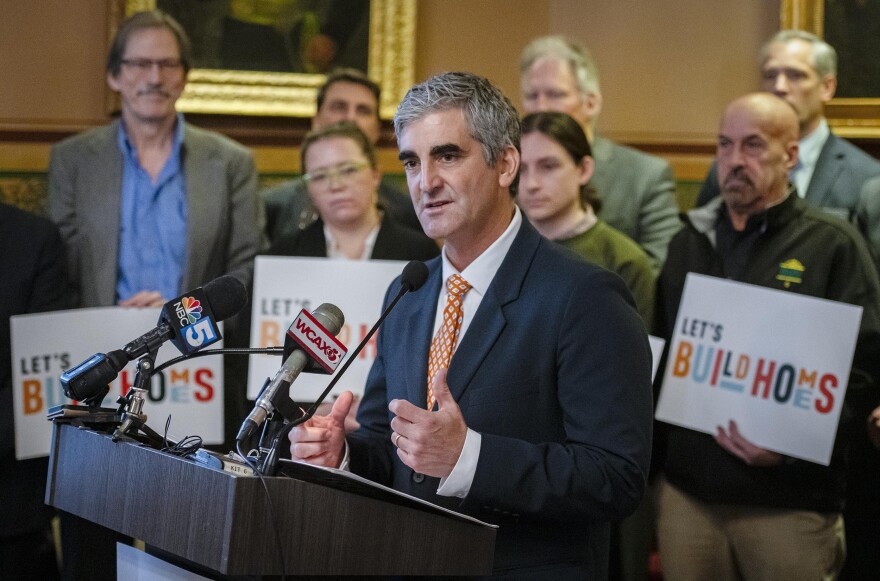A wide-ranging housing plan unveiled by Republican Gov. Phil Scott last month is now making its way through the legislative process, but it’s unclear how much of that proposal Democratic lawmakers will be willing to advance.
Scott wants to create financing tools for municipal infrastructure, make it harder for neighbors to appeal housing projects and lower regulatory barriers to new development.
In this week’s edition of the Capitol Recap, Vermont Public Statehouse reporter Peter Hirschfeld spoke with Report for America corps member and housing reporter Carly Berlin to find out what Scott is asking for, and why some lawmakers aren’t entirely on board. This interview was produced for the ear. We highly recommend listening to the audio. We’ve also provided a transcript, which has been edited for length and clarity.
Peter Hirschfeld: Carly, housing, or lack thereof, is obviously a huge issue for Vermonters right now and something Phil Scott came into this session saying he was going to be seeking major action on. He’s since unveiled his omnibus housing package to lawmakers. Big picture — make it understandable for those of us that aren’t following this issue as closely as you are — what is the governor asking lawmakers to do?
Carly Berlin: A couple key things in this big package — the governor wants to make it easier for smaller towns to build the infrastructure that’s needed for new housing. So think sewer systems, water lines, roads. Those things, they often fall to the developer to do, and that adds costs to housing. So they want funding, financing tools for that piece.
The administration also wants to take on appeals for new housing. So think of, if a new housing project is going up next to you, you don’t like it, and you want to take the developer to court — the administration wants make that harder, make those challenges to new housing more difficult.
And then the administration also wants to reopen Act 181, which was this big Act 250 reform bill that passed last year that basically tried to ease Act 250’s reach in some already developed places, to make it easier to develop housing, strengthen environmental regulations in other places. The administration doesn’t feel like that balance was quite right, so Scott wants to see some of the environmental rules stepped back a little bit and tip the scales more towards housing.

Peter Hirschfeld: So, funding for the infrastructure we need for housing, address the NIMBY issue and more Act 250 reform — how is this landing with Democratic lawmakers so far?
Carly Berlin: On the Act 250 piece, in particular, there’s a real feeling among lawmakers that to get this big reform bill through last year took so much negotiating — it was a "grand bargain," that’s the term that I keep hearing over and over again. So there’s a real hesitancy around reopening that can of worms this year, so we’ll have to see if lawmakers end up having the appetite for that.
On the appeals piece, I think there’s interest among legislators in kind of tackling these drawn-out court challenges that happen. But there was also a study to look at how to change appeals in Act 181 last year, so I’m also hearing, "Let’s wait and see what the study tells us. Let’s maybe not go too far down that road this year."
Peter Hirschfeld: Phil Scott is obviously not the only elected official that has made hosing a priority. Democratic lawmakers came into the session too saying, "Hey, this is at the top of our list." Any big proposals that we’ve seen so far from the House or Senate related to this?
Carly Berlin: Not really. Both the House and Senate committees responsible for housing have been looking at the governor’s package and coming up with committee bills in reaction to it. But we haven’t really seen them come out and say, "Here’s our list of priorities this year."
A couple weeks ago, House Democrats had a press conference about their housing agenda. And they spent most of the time talking about things that they’d done already. And so I asked them, "OK, that's great. What comes next?" And they didn’t really have a clear set of policy goals in front of them. And I’ll be curious to see if that emerges.

Peter Hirschfeld: Phil Scott is making the hard case that land-use regulations are the thing that is holding back construction of affordable housing in this state. Is that theory borne out by data and analysis? Can we have any certainty or confidence that if we do the things Phil Scott is telling us to do, we’re going to see more housing as a result?
Carly Berlin: We don’t have a ton of great data and analysis on this in Vermont. I will say that this bill, Act 181, from last year, had some temporary exemptions for new housing. And I had a story out before the turn of the year that showed, actually, a lot of developers have perked up their ears. And they’re starting to work on new projects that are really based around those carveouts, because they don’t have to go through Act 250. So we’re starting to see some results from that approach.
Whether focusing exclusively on land-use rules is going to get us all the housing we need? It’s such a scale issue — I mean, many more thousands of units more. This is a very difficult environment to build in right now. Construction costs are high. Interest rates are high. Labor costs are high. It’s hard to find builders. And so in that challenging landscape, focusing on land-use rules is kind of, one of the things at least that policymakers here can do, that’s in their control to do.
Have questions, comments or tips? Send us a message.






